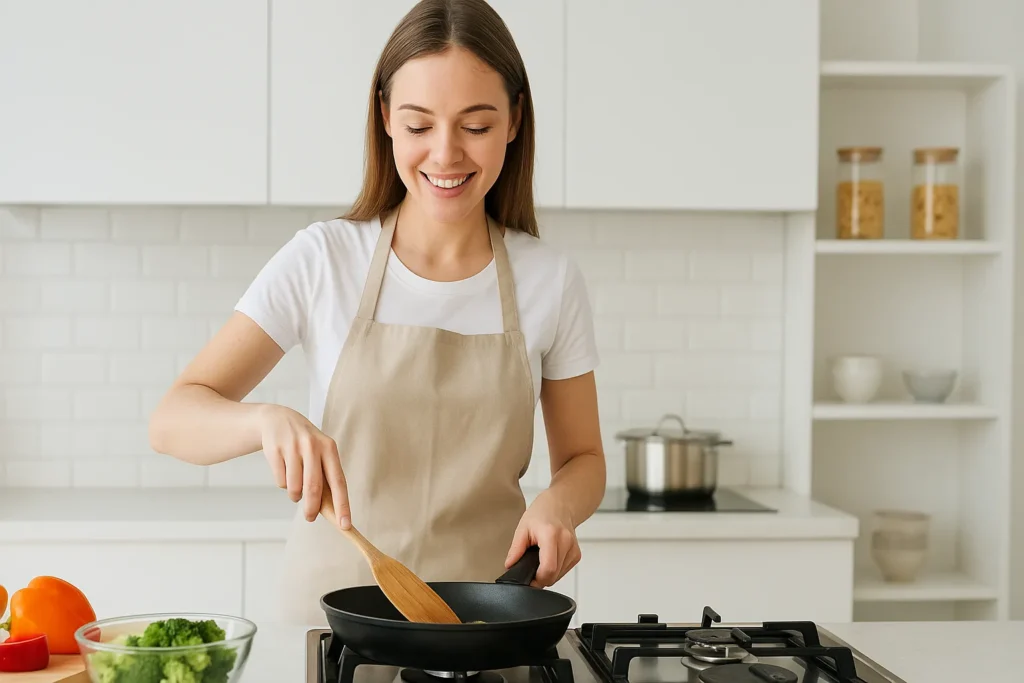
Ever stared at a recipe and thought, “What does ‘sauté’ even mean?” If you’ve found yourself in the kitchen wondering how to tell the difference between a whisk and a spatula (don’t worry, we’ve all been there), you’re not alone. Cooking can seem intimidating, especially when you’re just starting out. But here’s the good news: with a few essential skills and the right mindset, you can go from kitchen newbie to confident home cook in no time! Let’s break it down into bite-sized steps — no stress, no confusion, just good food and a whole lot of fun.
1. Start Simple: Master the Basics First
Before you start tackling gourmet meals or trying to replicate the latest TikTok food trend, focus on the basics. You don’t need a Michelin star kitchen to make a great meal. Start with easy recipes like scrambled eggs, pasta, or stir-fries. These are quick, satisfying, and will teach you essential skills like chopping, sautéing, and boiling.
The key here is to build your confidence. Once you’re comfortable with basic techniques, you can start adding more complicated ingredients and flavors. Remember, Rome (or in this case, your cooking skills) wasn’t built in a day.
2. Equip Yourself with the Right Tools
Let’s talk about kitchen tools. You don’t need a whole drawer full of gadgets to get started — just a few key items will do. At the very least, you’ll need:
- A good knife: Trust me, a sharp knife makes a world of difference. It’s safer and more efficient than a dull one.
- Cutting board: Avoid cutting directly on counters to keep things neat (and your knife sharp).
- A skillet or frying pan: A non-stick pan is great for beginners, especially when making eggs or sautéing vegetables.
- A pot: For boiling pasta or making soup, a medium-sized pot is your best friend.
- Measuring cups and spoons: Precision is important, even when you’re just tossing together ingredients. Plus, they’re cheap and easy to find!
A few other items, like a wooden spoon and a spatula, will also make your life much easier. And remember: you don’t have to buy the fanciest gadgets out there — focus on quality over quantity.
3. Understand the Power of Heat
It sounds simple, but heat control is one of the most important skills to master. From searing a steak to sautéing vegetables, knowing how much heat to use can make or break your dish.
- Low heat is great for simmering sauces, gently cooking delicate ingredients, or making scrambled eggs without them turning into rubber.
- Medium heat is perfect for most cooking, like making pancakes or sautéing onions.
- High heat is used for things like searing meat or stir-frying. But be careful! If you’re not paying attention, that high heat can burn your food faster than you can say “charred.”
If a recipe calls for “medium-high heat,” don’t just throw your pan on the burner and crank it up to full blast. It’s about finding that perfect balance to cook your food evenly without turning it into charcoal.
4. Seasoning Is Key
Here’s a secret: seasoning can make the difference between “meh” and “wow” in your meals. You don’t need an entire spice cabinet right off the bat, but there are a few essentials to get you started:
- Salt and pepper: These are your basics. Salt enhances flavors, and pepper adds that little zing.
- Garlic powder: Perfect for almost anything, from pasta to roasted vegetables.
- Dried herbs: Oregano, thyme, and basil are versatile and can be added to everything from tomato sauce to chicken.
Don’t be afraid to experiment! The beauty of cooking is in the small tweaks that suit your taste. Add a bit of salt, taste, and adjust. A pinch here, a dash there, and soon you’ll have an intuitive sense of what makes a dish pop.
5. Learn How to Follow Recipes (Without Getting Overwhelmed)
You don’t have to follow every step in the recipe exactly to a T, but the first few times you cook something, it’s good to be detailed. Trust the process — and the recipe!
Here’s the trick: read through the entire recipe before you start cooking. That way, you know what’s coming next and can prep everything beforehand. Get all your ingredients out (this is called “mise en place,” which is just a fancy way of saying “get your life together before the cooking begins”). This will help you avoid the dreaded “Oh no, I forgot to preheat the oven” moment.
6. Keep It Fun: Cooking Shouldn’t Be a Chore
One of the biggest mistakes beginners make is thinking they have to be perfect. Mistakes are part of the process — and let’s be real, they’re usually pretty hilarious! Ever accidentally used a tablespoon instead of a teaspoon? It happens. But it’s all about learning and improving.
Cooking should be fun, not stressful. Play some music, pour yourself a glass of wine (or whatever helps you unwind), and enjoy the process. The more you cook, the easier it will become.
7. Don’t Forget to Taste as You Go
Cooking is like a performance, and your taste buds are the audience. Don’t wait until the dish is done to find out if it needs more salt or spice. Taste as you go, adjust the seasoning, and add ingredients little by little. This is especially important when you’re making sauces or soups. You’ll be amazed at how much better your food will taste if you stop to give it a little love along the way.
